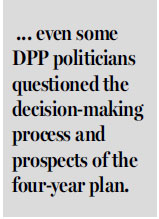Tsai's costly plan is against the will of people
Early this month, Taiwan lawmakers approved an infrastructure stimulus plan designed to boost demand and thus the island's economy. The "proactive" stimulus plan, which the Tsai Ing-wen administration had said in March would involve 880 billion New Taiwan dollars ($29 billion) and be spread over eight years, ended up with only half the originally planned investment and duration.
The compromise was made after lawmakers from both the ruling Democratic Progressive Party and opposition parties such as Kuomintang criticized the original version as backdoor dealing and poor planning. The project could be extended after four years through legislative approval.

Despite concessions, even some DPP politicians questioned the decision-making process and prospects of the four-year plan. Taipei Mayor Ko Wen-je has dismissed the plan as a waste of money, while some senior economists say they fail to see anything "proactive" or financially feasible in the plan, which explains why Tsai had to reduce its investment and duration to half.









